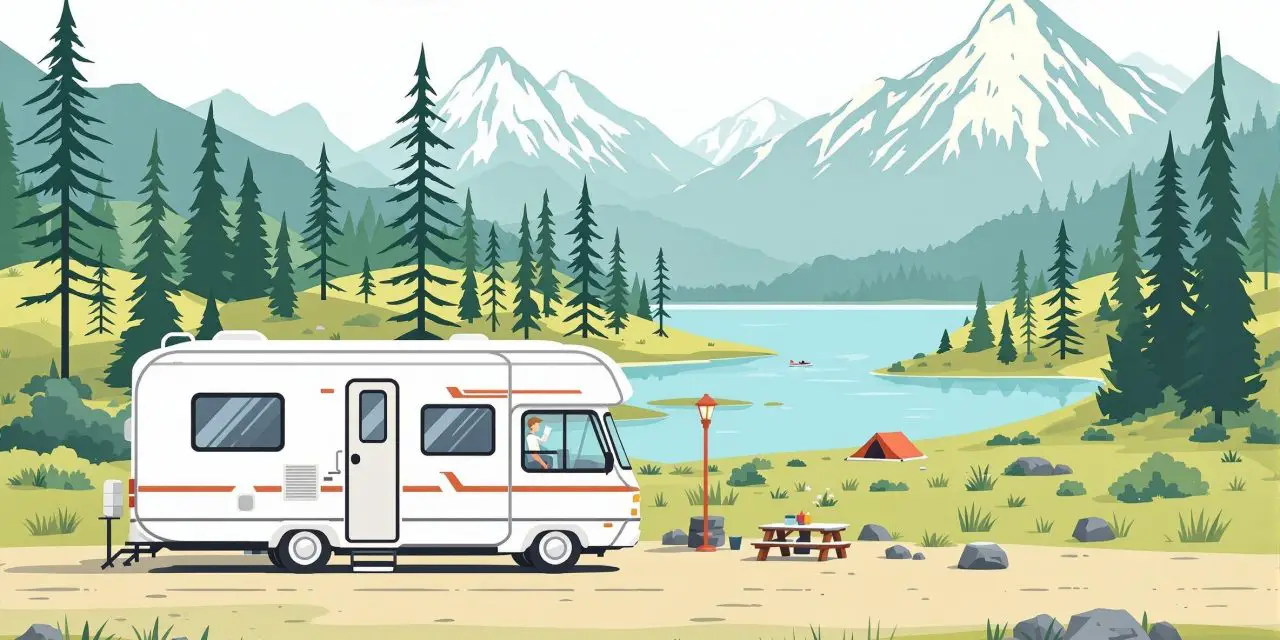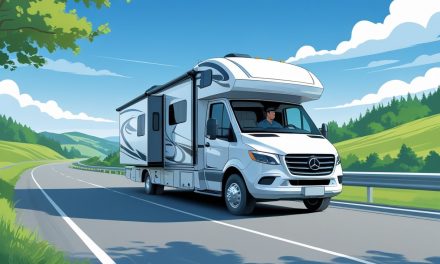Would you like to save this article?
Embarking on a full-time RV adventure is like diving into a pool of endless possibilities and exciting new horizons. After watching the journey of seasoned RV enthusiasts who’ve logged over 3,677 days (that’s more than 10 years!) on the road, it’s clear that the lifestyle brings both incredible joys and unexpected challenges.
These road warriors have traversed all 50 states, ventured into Mexico and Canada, and lived in 10 different RVs—all in spaces smaller than your average living room. Their decade of experience has produced valuable wisdom that could save you thousands of dollars and countless headaches.
Whether you’re dreaming of hitting the road or already rolling along America’s highways, these hard-earned lessons will help you avoid the pitfalls that can derail your RV dreams. So buckle up and prepare to learn from those who’ve already navigated the bumps along the way!
1. Skipping the RV Inspection
One of the most costly mistakes you can make when purchasing an RV is skipping a professional inspection. The experienced couple in our video bought their first RV used from an individual without a thorough check. What followed was a nightmare scenario involving a hurricane, pouring rain, and discovering water literally gushing from their new purchase due to pipes that had burst during a cold winter. The repair bill? A whopping $3,000, plus weeks of waiting and additional travel to retrieve their RV.
The Facts:
- A professional RV inspection typically costs $300-$500 but can save thousands in repairs
- According to the RV Industry Association, nearly 40% of used RVs have at least one major hidden issue
- Water damage is one of the most common and expensive problems in used RVs
I’m pretty sure the only thing that should be pouring out of your new RV is excitement—not your retirement fund! Remember, that “great deal” might just be someone else’s nightmare wearing a “For Sale” sign.
2. Choosing the Wrong RV
After their first RV disaster, our road veterans made another common mistake—going from one extreme to another. They jumped from a modest 28-foot trailer with no slides to a massive 43-foot fifth wheel with five slides. While the space seemed amazing, they quickly discovered that weekend-designed RVs aren’t built for full-time living. More critically, they hadn’t considered cargo capacity, leaving them unable to bring basic necessities without overloading their home on wheels.
The Facts:
- Cargo capacity (how much weight you can add to your RV) is often severely limited, even in large RVs
- Most RVs are designed for weekend or vacation use, not full-time living
- According to RV Consumer Group, more than 70% of first-time buyers choose an RV that doesn’t match their actual needs
That 43-foot palace might make you feel like RV royalty until you realize you can’t bring your favorite coffee mug because it puts you over the weight limit. Suddenly you’re drinking morning coffee from your hands like a woodland creature.
3. Buying the Truck First
Imagine finding the perfect truck, buying it, and then discovering it can’t safely tow your dream RV. That’s exactly what happened to our experienced RVers. They purchased a 2009 Ford with a 6.4 engine advertised to tow 25,000 pounds before selecting their fifth wheel. On their very first shakedown trip, the truck’s cooling line blew, resulting in two tow trucks (one for the truck, one for the RV) hauling them to their inaugural campground.
The Facts:
- Pin weight (how much weight sits directly on the truck) is often more limiting than total towing capacity
- According to a survey by RV Travel, 64% of RVers who bought their tow vehicle first ended up replacing it within two years
- Single rear wheel trucks often struggle with large fifth wheels regardless of advertised towing capacity
Nothing says “we’re living the dream” quite like being towed to your first campground. It’s like getting a piggyback ride to the finish line of your first marathon—technically you arrived, but not quite how you imagined.
4. Living Like You’re on Vacation
When you’re traveling to exciting new places every week, it’s tempting to treat every day like you’re on vacation. Our experienced RVers found themselves eating out constantly, trying to visit every attraction, and moving at an unsustainable pace. The result? Expanding waistlines, shrinking bank accounts, and increasing stress levels.
The Facts:
- The average American gains 7.7 pounds on a two-week vacation
- Dining out costs approximately 300% more than cooking at home
- According to a study of full-time RVers, those who establish routines similar to traditional home life report 76% higher satisfaction with the lifestyle
Your RV might have wheels, but your budget and pants buttons don’t have the same flexibility. Finding that balance between “we live here” and “we’re just visiting” might be the difference between a six-month adventure and a decade on the road.
5. Decision Fatigue
In a traditional home, you rarely worry about where you’ll sleep tonight or where to get clean water. In an RV, these decisions become part of daily life. Our veteran RVers weren’t prepared for the mental toll of constantly making decisions about parking locations, water sources, dump stations, propane refills, and safe travel routes.
The Facts:
- The average adult makes about 35,000 decisions daily; RV life can add hundreds more
- Psychologists report that decision fatigue significantly impacts quality of life and stress levels
- A survey of full-time RVers showed that 82% establish decision-making systems to reduce daily stress
Who knew that “where am I sleeping tonight?” would become a legitimate daily question rather than just something you ask after your third margarita? The mental gymnastics of RV life deserve an Olympic category.
6. Waiting to Build Community
One of the biggest surprises for our experienced RVers was discovering how important community becomes when you’re constantly on the move. Initially focused solely on family time and exploring, they missed the rich connections that make RV life sustainable long-term. Only after attending their first rally did they realize what they’d been missing.
The Facts:
- Studies show that social connections are one of the strongest predictors of happiness and longevity
- According to a survey of long-term RVers, 91% cite community as a primary reason they continue the lifestyle
- RV organizations like Full-Time Families, Escapees, and Xscapers host hundreds of events annually specifically designed for building connections
Turns out watching a sunset alone is nice, but watching it with friends who also understand the unique joy of successfully emptying your black tank without disaster? That’s priceless bonding.
7. Unsafe Rest Area Experience
Even after nearly a decade on the road, our experienced RVers encountered a frightening situation at a rest area that seemed perfect on paper. Despite positive reviews and a separate section for RVs, they had a threatening encounter with another traveler that forced them to pack up and flee in the middle of the night. When they called 911, it took nearly two hours to get a callback.
The Facts:
- According to the U.S. Department of Transportation, approximately 1.5% of rest area users report safety concerns
- Most experienced RVers recommend established campgrounds, Harvest Hosts, or Boondockers Welcome instead of rest areas
- Traveling with a buddy system (multiple RVs together) reduces security incidents by over 80%
Nothing tests your RV’s “quick departure” capabilities quite like an angry stranger ripping off his shirt and threatening you. Suddenly, that 60-second emergency pack-up drill you practiced becomes surprisingly useful.
8. Thinking RV Life Would Be Cheap
Many people turn to RV life expecting significant cost savings compared to traditional housing. Our veteran RVers discovered that while it’s possible to save money, the typical way people actually travel in RVs—moving frequently and exploring attractions—often costs the same or more than living in a house.
The Facts:
- According to RV consumer surveys, the average full-time RVer spends between $2,500-$4,000 monthly
- Fuel costs alone can exceed $500 monthly for frequent travelers
- RVers who stay in one place for a month or longer typically save 40-60% on campground fees
The good news: you can live in a tiny house on wheels! The bad news: that tiny house drinks diesel fuel like it’s planning to quit tomorrow, and apparently campgrounds charge more per night than some fancy hotels. The freedom of the open road comes with a surprisingly specific price tag.
9. Moving Too Fast
In their eagerness to “see it all,” our experienced RVers maintained an exhausting pace for years, assuming each year might be their last on the road. The constant movement increased costs, amplified decision fatigue, and often resulted in superficial experiences rather than deep connections with places.
The Facts:
- A survey of RVers who’ve been on the road 5+ years shows that most eventually settle into staying 2-4 weeks in each location
- Moving every 2-3 days can double or triple your monthly expenses compared to weekly or monthly stays
- National Park rangers report that the average visitor spends less than 4 hours in the park, missing 90% of what makes it special
Trying to see Yellowstone in a day is like trying to read War and Peace during a commercial break—technically possible, but you might miss some important plot points and probably won’t enjoy the experience.
10. Not Starting Sooner
The biggest regret shared by our veteran RVers was not beginning their adventure earlier. They originally planned for just one year on the road but discovered a lifestyle they loved. Looking back, they wish they’d known about the possibilities of remote work and RV living before having children, though they’ve thoroughly enjoyed raising their kids on the road.
The Facts:
- According to a survey of full-time RVers over 50, 87% wish they had started at least 10 years earlier
- Remote work opportunities have increased by over 400% in the past decade, making RV life accessible to more people
- Families who RV full-time report spending 60% more quality time together than in traditional living situations
Life comes in seasons—pre-kids, young kids, older kids, empty nest—and each offers different RVing experiences. Waiting for the “perfect time” is like waiting for your gas tank to fill itself; sometimes you just need to make the decision to fuel up and go.
Conclusion
After a decade on the road, these seasoned RV travelers have certainly collected their share of stories, mishaps, and wisdom. Their journey through all 50 states and beyond has produced valuable lessons that can help you avoid costly mistakes and maximize your own RV adventure. Remember that proper preparation, realistic expectations, and flexibility are your best companions on the road. Most importantly, don’t let fear keep you from taking the leap if RV life calls to you. As our veteran travelers discovered, sometimes the biggest risk is not taking one at all.
By embracing these lessons and approaching RV life with both excitement and wisdom, you can create your own remarkable journey—one beautiful campsite, unexpected detour, and unforgettable sunset at a time. The open road is waiting. Will you answer its call?
SOURCES:
- Less Junk, More Journey YouTube Channel
- RV Industry Association
- RV Travel Survey Data
- U.S. Department of Transportation Rest Area Safety Reports
- RV Consumer Group





